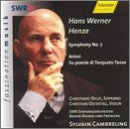| All Artists: Hans Werner Henze, Sylvain Cambreling, SWR Baden-Baden and Freiburg Symphony Orchestra, SWR-Sinfonieorchester Baden-Baden und Freiburg, Christiane Oelze Title: Hans Werner Henze: Symphony No. 7 Members Wishing: 2 Total Copies: 0 Label: Hanssler Classics Release Date: 1/28/2003 Genres: Pop, Classical Styles: Vocal Pop, Historical Periods, Modern, 20th, & 21st Century, Symphonies Number of Discs: 1 SwapaCD Credits: 1 UPCs: 040888304722, 4010276012672 |
Search - Hans Werner Henze, Sylvain Cambreling, SWR Baden-Baden and Freiburg Symphony Orchestra :: Hans Werner Henze: Symphony No. 7
 | Hans Werner Henze, Sylvain Cambreling, SWR Baden-Baden and Freiburg Symphony Orchestra Hans Werner Henze: Symphony No. 7 Genres: Pop, Classical
|
Larger Image |
CD Details |
CD ReviewsHenze as he deserves Jo�o Viana | Porto, Portugal | 11/18/2003 (5 out of 5 stars) "There's a long time we are expecting Henze's 8th symphony on CD. Quite mysteriously it hasn't been released yet while the 9th is already out on EMI since 1999 and I believe the 10th will come out soon. Instead, now, this new issue of the 7th directed by Sylvain Cambreling on Hänssler has been released making two along with Sir Simon Rattle's on EMI. It seems the desired 8th will have to wait - let's hope it'll be just a question of time. This weird delay may lead someone to hesitate before this (unexpected) issue of Henze's 7th. However, in no way it will be excessive to have another superb interpretation of this overwhelming symphony specially when it has such a transparency and sharp definition in an impeccable conducting like this one. The booklet reveals most interesting new info about the Hölderlin origin of the symphony. I think it's out of question to compare it here to Rattle's previous reading (it will be a tough task) but, at least, the timing of each movement only differs in a few seconds! In the meanwhile let's not forget that Rattle on EMI also performs the "Barcarola" which is an extraordinary piece adding even more interest to the whole CD. Similarly, no matter how grandiose be the 7th, I think the main work here (and decisive for buying the CD for those who already have the Rattle) is the recording of the sumptuous "Ariosi" that fills the record with about 30 minutes of splendid music. I wonder if it is a first recording on CD - but nothing is mentioned about it. Together with other Henze's works for voice (like the even earlier "Nachtstücke und Arien") I think this is one of the most beautiful and intriguing works the composer ever wrote. The piece (from 63) is for soprano and violin with orchestra. Sometimes the violin (in the hands of Christian Ostertag) seems a reminiscence of the human voice together with the quite chromatic lament of the soprano, sometimes it gets independent and becomes a plain instrument dealing with the best passages of 60's Henze "personal" atonality. The seductive voice of Christiane Oelze is specially effective in the lamentation character of the Tasso poem offering a "latin" suffering warm ambience of sorrow with a most expressive intonation and appropriate striking vibrato - especially when her voice is left alone in a few bars a capella or in the end of a strophe. What seems at first a delicate cantata is suddenly interrupted by heavy eruptions of the orchestra sometimes emphasizing the soloists struggle but soon getting rarefied again in crystal-like atmospheric textures. Like Klaus Geitel said (Henze's biographer) it is a violin concert with soprano obligatto. The work is apparently rather assymetrical - quite often the soprano lets the violin rise as soloist for a rather long time. This alternation adds much oddity to the whole work. An absolute surprise.
Wrote years ago, the review above must be updated: 8th symphony has been released at last (in two labels, in one of them coupled with the third recording of the 7th) and the 10th is already out too for a long time." |

 Track Listings (9) - Disc #1
Track Listings (9) - Disc #1